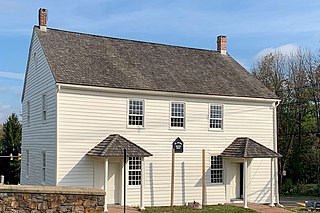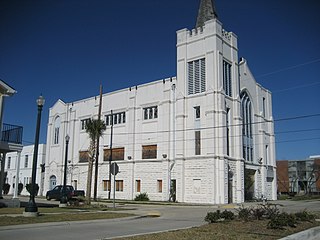
Bethel is a village in Shelby County, Missouri, United States. The population was 135 at the 2020 census.

The Mother Bethel African Methodist Episcopal Church is a historic church and congregation which is located at 419 South 6th Street in Center City Philadelphia, Pennsylvania, USA. The congregation, founded in 1794, is the oldest African Methodist Episcopal congregation in the nation.

William Keil was the founder of 19th-century communal religious societies in Bethel, Missouri, and Aurora Colony in Oregon.

The Greater Bethel AME Church is a historic church in Miami, Florida. It is located at 245 Northwest 8th Street. On April 17, 1992, it was added to the U.S. National Register of Historic Places. The church was built in 1927. On February 12, 1958, Dr. Martin Luther King Jr. delivered a speech at the church, "Launching Of The SCLC Crusade For Citizenship."
Bernhard Müller, known as Count de Leon, was a German Christian mystic and alchemist of uncertain origins.

Bethel Historic District is roughly bounded by Liberty, King, 1st, and 4th Sts. in Bethel, Missouri. Construction of the town, which was for over thirty years a successful experiment in communal living, began in 1844. The leader of the community was a German emigrant, charismatic autocrat Dr. William Keil. After his death, the communal structure gradually collapsed and the communal property was split among the community members. The district was added to the National Register of Historic Places in 1970. There are twenty-six contributing properties.

The Mount Bethel Baptist Meetinghouse is a historic church located at the intersection of County Route 651 and Mountainview Road in the village of Mount Bethel in Warren Township, Somerset County, New Jersey, United States. Built in 1786, it was added to the National Register of Historic Places on June 3, 1976, for its significance in architecture and religion.

Bethel Presbyterian Church is a historic Presbyterian church near Clover, South Carolina.

The William D. Fenton House in southeast Portland in the U.S. state of Oregon is a 2.5-story, single-family dwelling listed on the National Register of Historic Places. Built in the Queen Anne style in 1892, it was added to the register in 1979.

Bethel Church is a historic Methodist church located on Missouri Highway T near Labadie, Missouri. The church was built in 1868 to replace a log building constructed in 1840 for Franklin County's first Methodist congregation. The red brick building has an unornamented Greek Revival design. The building has a Greek temple form with a low gable roof and square brick pilasters flanking the door and separating the large side windows. The interior of the church has a high ceiling, a balcony above the narthex, and white-painted features.

Bethel Chapel AME Church is a historic African Methodist Episcopal church located at the junction of 6th and Tennessee Streets in Louisiana, Pike County, Missouri. It was built in 1884, and is a one-story, rectangular, gable roof brick church. It measures 60 feet by 37 feet and sits on a cut limestone foundation.

George W. Nebinger Elementary School is a K–8 school located in the Bella Vista neighborhood of Philadelphia, Pennsylvania. It is a part of the School District of Philadelphia.

The Union Bethel A.M.E. Church in New Orleans, Louisiana, at 2321 Thalia St. at the corner of Liberty St., is a historic African Methodist Episcopal church.

The Broad Street Historic District encompasses a significant portion of the historic center of Bethel, Maine. Broad Street dates to the early days of Bethel's settlement in the early 19th century, and its town common was a gift from the first settler of the area. As originally listed on the National Register of Historic Places in 1977, the district included the common and a section of Broad Street between Main Street and Paradise Hill Road. This was expanded in 1990 along Church Street to encompass historic homes and a portion of the Gould Academy campus.

The Dr. Moses Mason House is a historic house museum at the northeast corner of Broad Street and Mason Street in Bethel, Maine. Built c. 1813–15, it is notable as the home of one of Bethel's early doctors and first postmaster, Moses Mason (1789-1866), and for the murals drawn on some of its walls by the itinerant artist Rufus Porter. The building was listed on the National Register of Historic Places in 1972; it is now owned by the Museums of the Bethel Historical Society, and is open year-round for tours.

McKenstry Manor, also known as the Kellogg House, is a historic house on Vermont Route 12 in northern Bethel, Vermont. Built about 1800, it is a well-preserved example of Federal period architecture in the town, built based on a published design of Asher Benjamin. It was listed on the National Register of Historic Places in 1978.
Hebron is a historic home located near Bethel, Shelby County, Missouri. It was built about 1852, and is a two-story, brick and wood-frame building sheathed with clapboard. It has a medium pitched gable roof. It is a remaining building in one of four support areas associated with the Bethel German Conmunal Colony which lasted from 1844 to 1879, and founded by Dr. William Keil (1812-1877).

Aurora Colony, also called Aurora Mills, was a Christian utopian communal society founded in 1856 by William Keil in modern-day Aurora, Oregon, US. At its peak in 1868, the Aurora Colony had about 600 people and 15,000 acres (6,100 ha) of land. The colony, along with Keil's previously established Bethel colony, was formally dissolved in 1883. In 1974, about 150 acres (61 ha) and 12 buildings of the former colony were inscribed on the National Register of Historic Places as parts of the Aurora Colony Historic District.

Willie Keil's Grave State Park Heritage Site, part of the Washington State Parks system, is located on Washington State Route 6 north of Menlo, Washington, and 5 miles southeast of Raymond. The park is the burial site of Willie Keil, known as the "Pickled Pioneer".





















